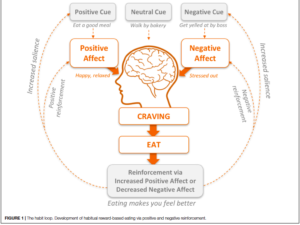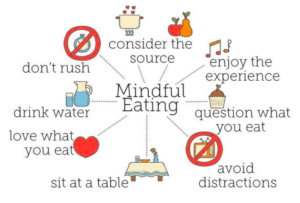No quick fix
Raise your hand if you ever tried a diet that helped you lose weight but the moment you returned back to your regular eating patterns you gained that weight back plus some.
I am here to tell you that there is no quick fix and “yo-yo” dieting is doing you more harm than good. Diets do not work because cutting out food groups or restricting your favorite foods will only leave you feeling frustrated and resentful. Just remember that you did not gain the excess weight overnight, in a month, or even a year. Weight gain happens over time and weight loss also has to happen over time. The key to healthy weight loss is to adopt a sustainable lifestyle that focuses on eating- mostly whole foods in their natural state, getting daily exercise, being more mindful and in tune with your body, and practicing healthy coping strategies (CDC, 2020).
There is a psychology behind food and our brain. In today’s society, being thin is more glamorized than being healthy. For that reason, people would rather restrict themselves of food they love to the point where they don’t eat despite physiological hunger. Many times people decide to take some “magic” pill, drink a “fat burning” herbal tea, or a fat loss shake to replace their meals.
There are two major maladaptive eating behaviors that people fall into- restrained eating and disinhibited eating. Restrained eating can be defined as dieting or deliberate food restriction and disinhibited eating is the inability to stop oneself from eating once started (Brewer et al., 2018). Disinhibited eating can occur after a period of restriction when your body is craving some type of food and once you get a taste of it you have no control over how much you eat despite your intentions to eat a little piece or just one slice.
Eating does not occur in a vacuum. You eat food for many reasons such as physiological hunger, internal cues such as emotions, and external cues such as seeing or smelling food (Brewer et al., 2018). In a world full of highly processed food rich in sugar, salt, and fat it is no wonder weight loss can be challenging and obesity is an epidemic worldwide.
We live in a busy, hectic world. We value always having something to do or somewhere to be. But that contributes to our stress and psychological stress has shown to be a secondary factor that can inhibit weight loss (Mason et al., 2016). This is why it is imperative to have coping mechanisms under our sleeve to deal with our emotions that come along with the stress. Diet and exercise will help a person lose weight, however, research shows that people who have few coping strategies are more likely to use food as a reward in order to reduce negative emotions (i.e stress, anger, anxiety, depression) (Mason et al., 2016). The foods people crave the most during stressful times are high carbohydrate, sugary, fatty foods with high caloric content and little to no nutritional value. Look, I get it! Life is hard and stress is inevitable (afterall we are human) but the key is coping with stress in healthy ways rather than ignoring the problem and turning to food to help us feel better. We all know that eating that big brownie or indulging in all that yummy pasta feels good in the moment but we tend to feel bad afterwards which can bring on more negative emotions. So you might be thinking… What are some useful coping strategies? Taking care of ourselves, mentally and physically, through healthy diet and exercise, practicing mindfulness, getting adequate sleep, drinking enough water, seeking social support, and trying to keep a positive attitude. For in depth information on these strategies plus some more tips click here to read more.
The weight loss struggle is real! For some it may come easy and within just a few weeks you may have lost 10-20 pounds. However, the catch is keeping that weight off, aka maintenance. Like I talked about earlier, dietary restriction proves to have little to no long-term benefits. Weight loss and living a healthy life is a journey. Gradual and steady weight loss of one to two pounds per week is more likely to stay off (CDC, 2020). This is where the coping strategies are going to become useful. Psychological stress contributes to cravings and overeating. Scientific research has found correlations between habitual maladaptive eating behaviors and emotions such as stress, anger, depression, and anxiety (Brewer et al., 2018). Our brain remembers the food we ate when we endured such emotions- this is termed positive and negative reinforcement. Our brains go through a process called the habit loop, which is reinforcement via positive affect (happy/relaxed) or decreased negative affect (stress). Cravings are what link positive and negative behaviors to eating and psychological deprivation is more likely the reason for food craving (Brewer et al., 2018).

So how can cravings be managed? Let’s start by getting back to the basics! Healthy and realistic eating patterns can be sustained through eating all food groups with a special emphasis on eating mostly whole foods, while limiting added sugar, sodium, and saturated fat intake (health.gov; CDC, 2015). Eating more fruits, vegetables, whole grains, legumes, nuts/seeds, fish, lean meats, and healthy fats such as olive oil, being active, and practicing mindfulness. Through mindfulness training, individuals can become aware and move through their emotions and thoughts that make up cravings instead of just trying to avoid, resist, or suppress cravings (Brewer et al., 2018). Mindfulness helps increase awareness of our body such as actual hunger (meeting caloric and nutrient needs) and satiety cues. Mindfulness helps distinguish between emotional eating and physical hunger. When people create awareness of cravings/emotions they are able to tolerate their cravings without overeating (Mason et al., 2016). To read more mindful eating and how to incorporate it into your daily routine click here.

St. Vincent (2018). What is Mindful Eating? Retrieved from https://hgwellnesscenter.com/ask-the-expert/what-is-mindful-eating/
So what is the deal with exercising? When it comes to exercise and fitness there is no one size fits all approach. We have to learn how to make it our own but most importantly we need to make it happen. Recommendations for weight loss range from 30-60 minutes per day of moderate intensity exercise; weight maintenance takes a step up from there and moves to 30-90 minutes per day. There is a dose-response relationship with exercise; the greater the time and intensity the more weight loss and great weight maintenance (Donnelly et al., 2004). The secret to exercising is to have fun. Why would you engage in something that makes you miserable? The human brain will make that connection and you still start to “over-think” it and want to do something else rather than exercise. Good news is that exercise does not have to happen all at one time and there are behavioral strategies to begin exercising and also to maintain exercising for long-term. Adopting a combination of self-monitoring, SMART (Specific, Measurable, Achievable, Realistic, Time- sensitive) goal setting, stress management, seeking social support, relapse prevention, stimulus control, cognitive restructuring and problem solving are very helpful in overcoming barriers of daily life (Donnelly et al., 2004). These same strategies also work with maintaining healthy eating patterns. Learn more about how to use SMART goal setting HERE.
* Tips from the CDC on maintaining weight loss.
The bottom line is that there is no quick fix for weight loss. I am not here to say it is going to be easy. It takes a commitment and consistent effort on a daily basis. Eating healthy food is fun and enjoyable. You do not have to give up your favorite foods. Everything in moderation is key! Move your body, eat more whole foods, practice mindfulness, and have goals. Be kind to yourself because you are doing great. Stay the course…Your body and mind will thank you!
References:
Brewer, J.A., Ruf, A., Beccia, A.L., Esslen, G.I., Finn, L.M., Van Lutterveid, R., & Mason, A.E. (2018). Can Mindfulness Address Maladaptive Eating Behaviors? Why Traditional Diet Plans Fail and How New Mechanistic Insights May Lead to Novel Interventions. Frontiers in Psychology, 9(1418). doi: 10.3389/fpsyg.2018.01418
Centers for Disease Control and Prevention (2020). Losing Weight. Retrieved July 22, 2020 from https://www.cdc.gov/healthyweight/losing_weight/index.html
Centers for Disease Control and Prevention (2015). Keeping it off. Retrieved July 22, 2020 from https://www.cdc.gov/healthyweight/losing_weight/keepingitoff.html
Dietary Guidelines (2015-2020). Chapter 1: Key Elements of Healthy Eating Patterns. Retrieved from https://health.gov/our-work/food-nutrition/2015-2020-dietary-guidelines/guidelines/chapter-1/a-closer-look-inside-healthy-eating-patterns/
Donnelly, J.E., Smith, B., Jacobsen, D.J., Kirk, E., DuBose, K., Hyder, M., Bailey, B., Washburn, R. (2004). The Role of Exercise for Weight Loss and Maintenance. Best Practice & Research Clinical Gastroenterology, 18(6), p. 1009-1029. Doi: 10.1016/j.bpg.2004.06.022
Mason, A.E., Epel, E.S., Aschbacher, K., Lustig, R.H., Acree, M., Kristeller, J., Cohn, M., Dallman, M., Morna, P.J., Bacchetti, P., Laraia, B., Hecht, F.M., & Daubenmier, J. (2016). Reduced Reward-Driven Eating Accounts for the Impact of a Mindfulness-based Diet and Exercise Intervention on Weight Loss: Data from the SHINE Randomized Controlled Trial. Appetite, 100. pp. 86-93. http://dx.doi.org/10.1016/j.appet.2016.02.009
Robinson, L., Smith, M., & Segal, R. (2019). Stress Management. Retrieved August 3, 2020 from https://www.helpguide.org/articles/stress/stress-management.htm
Segal, J., Robinson, L., & Cruz, M. (2019). Mindful Eating. Retrieved August 1, 2020 from https://www.helpguide.org/articles/diets/mindful-eating.htm
Stibich, M. (2020). SMART Goals for Lifestyle Change. Retrieved August 5, 2020 from https://www.verywellmind.com/smart-goals-for-lifestyle-change-2224097
St. Vincent (2018). What is Mindful Eating? Retrieved from https://hgwellnesscenter.com/ask-the-expert/what-is-mindful-eating/